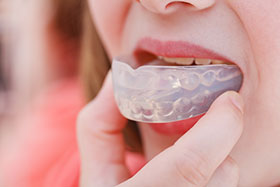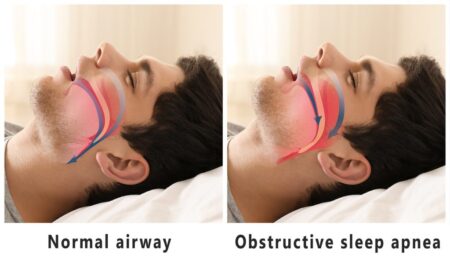Sleep Apnea:
Sleep apnea is a serious sleep disorder in which a person’s breathing is interrupted while sleeping. Untreated sleep apnea causes people to stop breathing frequently during the night, sometimes hundreds of times.
There are three types of sleep apnea: Obstructive, central, and mixed sleep apnea.
- Obstructive Sleep Apnea:
Obstructive sleep apnea is the most common type. This occurs when the upper airway is partially or completely blocked during sleep. During an apnea episode, the diaphragm and chest muscles work harder to open the airway as the pressure rises. Breathing usually resumes with a loud gasp or jerk of the body. These episodes can disrupt sleep, reduce oxygen flow to vital organs, and cause heart rhythm issues.
- Central Sleep Apnea:
The airway is not blocked in central sleep apnea, but the brain fails to signal the muscles to breathe due to instability in the respiratory control center. Central apnea is associated with the central nervous system and cannot be treated by oral appliance therapy.
- Mixed Sleep Apnea:
Mixed sleep apnea is a combination of obstructive and central types.
Who is affected by obstructive sleep apnea?
It can affect people of all ages, including babies and children, but it is most common in people over 40 and those who are overweight.
Certain physical characteristics and clinical features are common in obstructive sleep apnea patients, like:
- Excessive weight
- A large neck
- Structural abnormalities that reduce the diameter of the upper airway, such as nasal obstruction, a low-hanging soft palate, enlarged tonsils, or a small jaw with an overbite
What are the signs and symptoms of sleep apnea?
The partner is often the first to notice the first signs. Many of those affected have no complaints about their sleep. The following are the most common OSA symptoms:
- Snoring
- Sleepiness or fatigue during the day
- Sudden awakenings with a sensation of gasping or choking during sleep
- When you wake up, you may have a dry mouth or a sore throat.
- Cognitive impairment, such as difficulty concentrating, forgetfulness, or irritability
- Sweating at night
- Headaches
How Can A Dentist Recognize Sleep Apnea?
Although a dentist cannot formally diagnose, they can identify and warn you of potential symptoms.
Some people are completely unaware that they have the condition until a dentist informs them of their potential symptoms.
Many people distinguish dentists from other healthcare professionals, not realizing that many health problems manifest themselves through oral health.
Dentists can detect tooth wear on the occlusal (chewing) surfaces. These patients frequently have worn-down teeth from clenching their jaw in the middle of the night. This can result in issues such as excessive cavities and tooth cracks.
Other possible symptoms of the condition include:

- Small jaw.
- Scalloped edges on the tongue
- Red throat due to snoring
- Gumline recession
- Inflammation of the mouth
How does a mouthguard for obstructive sleep apnea work?
- If you are diagnosed, a dentist can create a custom mouth guard to address the root cause. Mouth guards keep the jaw forward and the tongue down, preventing the tongue from falling back into your mouth and obstructing your airway.
- Mouth guards are available over the counter, but one made from impressions of your mouth will fit better and be more effective. Preventing sleep apnea can improve your overall health by allowing you to finally get a good night’s sleep.
- Patients who are adjusting to wearing a mouth guard may be tempted not to wear them at first. It is normal to feel some discomfort and produce more saliva at first. These side effects will eventually fade as your mouth adjusts to the device.
- If you are experiencing severe discomfort, you should consult your dentist about adjusting the device.
CPAP Therapy
- Continuous Positive Airway Pressure (CPAP) is an alternative device that can help patients with mild cases.
- The CPAP is a mask connected to a pump that applies pressure to your airway at night to keep it open.
- Your healthcare provider can assist you in locating a properly fitting mask to encourage treatment use. There are several types of masks available, including full-face, nasal, and nasal pillows.
CPAP treatment, like mouth guards, necessitates some adjustment time. Many patients who stick with the treatment notice an increase in energy after a full night’s sleep.


